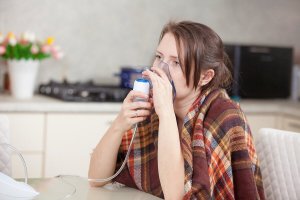Respiratory Health in Times of COVID-19


Written and verified by the doctor Leonardo Biolatto
SARS-CoV-2 is the coronavirus that’s behind the current pandemic. As this virus mainly affects our lungs, caring for our respiratory health in times of COVID-19 has become a central medical issue.
We know that this virus enters the body through the respiratory droplets that infected individuals expel. Within these droplets, that act as an aerosol, the coronavirus travels and spreads to the respiratory apparatus of a new host. They may also land on a surface that others may touch later and become infected.
Once the virus reaches the respiratory apparatus, SARS-CoV-2 travels to the alveoli of the lungs where it causes the greatest amount of damage. There, it produces swelling and the symptoms we already know: fever, cough, fatigue, and shortness of breath.
Respiratory health in times of COVID-19 is a pillar of prevention because not all suffer from this infection in the same way. Some people experience serious forms of this pulmonary illness that forces them into hospitalization in intensive care. If support measures fail, they must be connected to artificial respirators.
Among the groups that are at risk of developing serious forms of coronavirus are those with chronic respiratory illness. For example, people with asthma, chronic obstructive pulmonary disease (COPD), etc. We can also include smokers among the most vulnerable.
Respiratory health in patients with COPD in times of COVID-19
COPD, or chronic obstructive pulmonary disease, encompasses pathologies such as asthma, chronic bronchitis, emphysema, and atelectasis (collapsed lung). All of these have one thing in common: bronchial obstruction of the passage of air.
A patient with COPD usually has to take medication that boosts the opening of the bronchial tubes. Sometimes they require daily medication, while other times they only need it for acute crises. The most serious cases require oxygen, either for most of the day or only at night.
It’s only logical to suppose that patients with these characteristics are more vulnerable to the current pandemic. A SARS-CoV-2 infection can lead to an exacerbation of their condition and a high risk of requiring hospitalization.
The respiratory health of patients with COPD in times of COVID-19 is more important now than ever. If the virus attaches to lung tissue that’s already damaged, it can produce even more damage than expected.
In the case of hospitalization and the need for respiratory support, patients with COPD are at a great disadvantage. Their bronchial tubes are reactive and allow less air to pass through, reducing the availability of oxygen.
This risk group should be very careful regarding their habits. It’s important not to stop taking medication without consulting a doctor first. And, respecting social distancing regulations is of extreme importance.
If any symptoms appear, patients with COPD should consult a doctor immediately. Follow the instructions provided by your local authorities and avoid going in for medical attention before consulting by phone.

You may also want to read: Who is Most Vulnerable to COVID-19?
The danger of tobacco during the current pandemic
Tobacco is a very powerful toxic agent that has functions that are contrary to our respiratory health. It’s capable of affecting the cleansing mechanism of the cells in the mucous membrane of the respiratory apparatus. Therefore, it reduces a person’s natural defenses.
Our previous experience with the H1N1 flu pandemic allowed scientists to conduct research on the effect of tobacco on patients who smoked. In doing so, they discovered a strong association between the act of smoking and the risk of suffering from this flu.
And, when it comes to the current coronavirus, we have no other choice than to assume the same is true. Smokers should reduce their habit or, better yet, take advantage of this time to stop smoking altogether. Although confinement can be stressful and lead to greater tobacco abuse, it’s crucial that people make an effort to resist the temptation to smoke.

Respiratory illnesses that are not from coronavirus
While it may seem like COVID-19 is the only illness that exists right now, just the opposite is true. We need to remember that other diseases are out there as well, including respiratory illnesses. People are still getting colds, sinus infections, acute bronchitis, nasal allergies, etc.
When in doubt, it’s important to check with a doctor in order to differentiate symptoms. At the same time, avoid self-medicating at this time. Stay away from pharmaceuticals that are left over from other times that you or someone in your home experienced one of these illnesses.
Once authorities consider it safe for us to leave our homes and lift quarantine restrictions, it will be important for us to remain alert. When people begin to move about with relative normality, all of these respiratory illnesses will increase their circulation as well.
It’s important that we adopt good hygiene practices until they become second nature. These include washing our hands, sneezing and coughing into the inside of your elbow, and keeping your distance if you have symptoms.
Discover more: The Differences Between Viruses and Bacteria
Respiratory health in times of COVID-19 requires commitment
One of the things we keep hearing during this pandemic is that being careful is a shared responsibility. The same is true when it comes to respiratory health in times of COVID-19. Not only should patients with COPD make a commitment – the entire global community should. At-risk groups depend on the common sense and consideration to prevent the spread of coronavirus.
All cited sources were thoroughly reviewed by our team to ensure their quality, reliability, currency, and validity. The bibliography of this article was considered reliable and of academic or scientific accuracy.
- Lawrence H, Hunter A, Murray R, et al. Cigarette smoking and the occurrence of influenza– Systematic review. J Infect 2019;79:401–6.
- Shaker, Marcus S., et al. “COVID-19: Pandemic Contingency Planning for the Allergy and Immunology Clinic.” The Journal of Allergy and Clinical Immunology: In Practice (2020).
- Chica-Meza, Carmen, et al. “Cuidado Respiratorio En Covid-19.” Acta Colombiana de Cuidado Intensivo (2020).
This text is provided for informational purposes only and does not replace consultation with a professional. If in doubt, consult your specialist.








